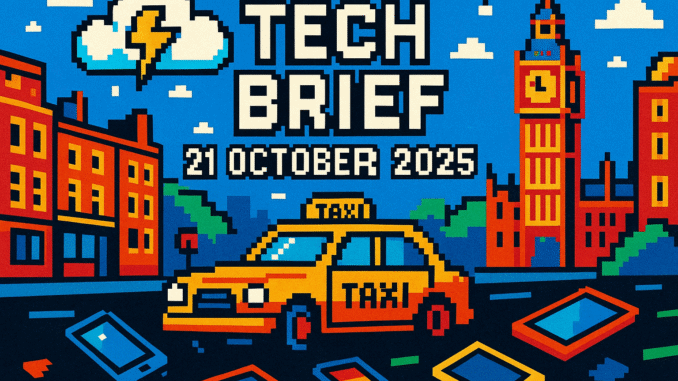
Tech Brief 21 October 2025 takes a clear-eyed look at today’s digital headlines. From robotaxis navigating London’s weather to the cloud’s latest hiccup, and a nod to the origins of modern memory, each story is chosen for its real-world impact, not just its buzz. Missed yesterday’s Tech Brief? [Catch up here](https://netscapenation.co.uk/tech-brief-20-october-2025-subtle-innovations/) before diving in.
### London’s Next Taxi Driver May Not Be Human: [Waymo Plots Robotaxis for UK Launch](https://www.theguardian.com/news/ng-interactive/2025/oct/18/driverless-cars-uk-autonomy-waymo-london)
“Driverless cars will never handle Camden on a Friday,” claims one minicab forum post. Waymo is betting otherwise, announcing plans to launch robotaxis in London in 2026. This is not just another Silicon Valley experiment; rather, it is a direct test of British infrastructure, from ancient road layouts to famously assertive drivers. The system uses AI-powered sensors, live mapping, and constant over-the-air updates. However, if a D-reg Metro blocks a zebra crossing in the rain, who takes responsibility? The real test is not the tech, but how well British cities adapt their streets and habits to fit new algorithms. For every bit of excitement, there is a healthy dose of London scepticism. The future may arrive in a Prius, but it will have to survive the school run first.
### [AWS Outage Fuels Worries over Cloud’s Fragile Monopoly](https://www.computerweekly.com/news/366632921/AWS-confirms-it-is-working-to-fully-restore-services-after-major-outage)
Yesterday, Amazon Web Services scrambled to restore service after a major North Virginia datacentre outage. The ripple effect was immediate. Streaming sites, government portals, and even some banks faltered. In the 1990s, the internet was built for decentralisation, with sysadmins everywhere hoping for resilience. Now, a handful of cloud providers handle the world’s data. One regional failure can knock millions offline. User forums filled with jokes about bringing back dial-up BBS, but the frustration was real. Why have we handed so much control to so few companies? As explored below in the infrastructure story, digital transformation can mean swapping the server cupboard for a shiny monoculture. The next outage may be just a rainstorm away.
### [UK’s Digital Infrastructure: Atos Places Its Chip](https://www.computerweekly.com/news/366632825/Frances-Atos-eyes-UK-public-sector-with-investment-in-secure-UK-infrastructure)
Atos, the French IT giant, has announced fresh investment in secure, accredited UK infrastructure, hoping to win public sector contracts. This is both a vote of confidence in post-Brexit Britain and a reminder of how much local control is slipping overseas. Is foreign investment a lifeline or one more sign of talent edging offshore? The answer is rarely neat. For many, it stirs memories of Acorn computers and Ferranti chips powering British ambitions. Atos’s move feels modern, but it draws a jagged line back to a time when “Made in the UK” was a badge of digital pride. As noted above on cloud security, the challenge is building resilience and independence in a world where hardware, software, and cables rarely stop at Dover.
### [Digital Duty of Care: Inquest into Harmful Forums](https://www.theguardian.com/technology/2025/oct/20/bereaved-families-call-for-inquiry-into-uk-failure-to-act-on-pro-suicide-forum)
At least 65 UK coroner warnings about pro-suicide forums have gone unheeded, sparking calls for an inquiry from bereaved families. This is more than a policy problem. Anyone who built or moderated a BBS knows how online communities can heal or harm. The scale is new, but the core lesson is old. Platforms today are larger, but their sense of responsibility has not kept up. Industry insiders and government departments offer few answers. The truth is awkward. Old lessons about moderation, once learned through trial and error in small, close-knit spaces, are still vital but too often ignored. There is no technical fix for empathy, but transparent stewardship would be a start.
## From the Wayback Machine
On This Day: 1949 – An Wang files US patent for the “pulse transfer controlling device,” the breakthrough that enabled reliable magnetic core memory. These modules, packed with tiny ferrite doughnuts, became the backbone of computers from the 1950s to the mid-1970s. IBM licensed Wang’s patent and built machines like the IBM 704 and 1401. The leap to writable, dependable RAM was not glamorous, but it changed everything. You can still see the logic of binary state storage in every stick of RAM and flash device today. Wang’s story shows how academic invention can quietly start an industry revolution.
## What This Means
Tech Brief 21 October 2025 asks what we really want from our digital foundations. Do we value resilience, local control, or just convenience? Every leap forward brings hidden trade-offs, visible only with a bit of historical perspective.
*Stay nerdy, keep your backups local, and never trust a cloud service with your Amiga ROMs. Tomorrow’s news is already loading, slowly, if AWS is down.*
*Missed yesterday’s Tech Brief? [Catch up here](https://netscapenation.co.uk/tech-brief-20-october-2025-subtle-innovations/)*

Leave a Reply